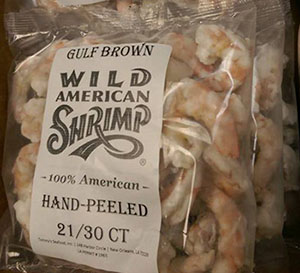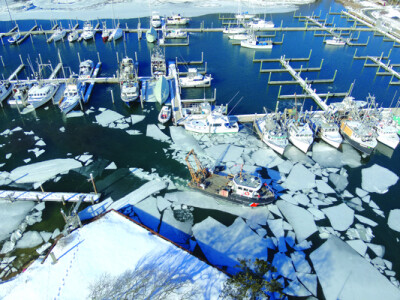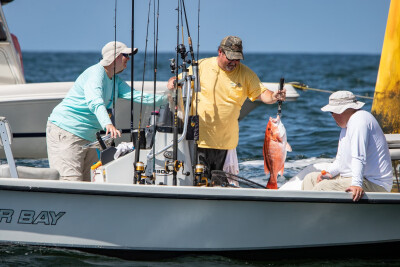Shrimp is a touchy subject lately.
Pulitzer Prize-winning reporting from the Associated Press has shined a light on rampant slave labor in the Thai shrimp industry, which exports much of its product to major retailers in the U.S. from Wal-Mart to Whole Foods.
In addition to human rights concerns, consumers might also fret about hygiene considering that the USDA recently released data on FDA refusals of imported food, and seafood products topped the list of items turned away. Why? The most common reason was “filth,” followed by salmonella and veterinary drug residue.
Not to mention environmental concerns associated with farmed shrimp, especially from outside the United States.
Between human rights, hygiene, and the environment, one can understand why some consumers might feel a little squeamish. But Americans love shrimp — it is this country’s most consumed seafood item, which makes it very big business indeed.
Thus it's no surprise that someone is trying to capitalize on this market with a synthetic shrimp replacement.
New Wave Foods was recently featured in The Atlantic on their plans to create “shrimp” from plant matter and algae. The company’s co-founder Dominique Barnes, who studied marine conservation at the Scripps Institution of Oceanography, said she was inspired by concerns over the environmental and human rights costs of fresh seafood.
“Dominique has experienced first hand the devastating impacts of commercial seafood production on the oceans,” reads her bio on the company’s website. “Her passion about marine conservation led her to start New Wave Foods with the mission to change the way we eat seafood.”
 New Wave Foods founders Dominique Barnes (left) and Michelle Wolf. New Wave Foods photo.Here’s the thing though — it’s not seafood. In their photograph on the New Wave Foods website, Barnes and co-founder Michelle Wolf pose before the backdrop of a working waterfront. It invites associations with fishermen, but their product is entirely lab-created, made from red algae and plant-based protein powder.
New Wave Foods founders Dominique Barnes (left) and Michelle Wolf. New Wave Foods photo.Here’s the thing though — it’s not seafood. In their photograph on the New Wave Foods website, Barnes and co-founder Michelle Wolf pose before the backdrop of a working waterfront. It invites associations with fishermen, but their product is entirely lab-created, made from red algae and plant-based protein powder.
“We’re not reproducing shrimp cells,” Barnes told the Atlantic. “We use a process that's similar to baking a loaf of bread.”
In a vacuum, I don’t have an issue with this concept. Algae and plant protein don’t gross me out, and I’d probably consider trying it. The Atlantic story quotes Lizzy Freier, an analyst with the food research and consulting firm Technomic, who expresses skepticism over consumer acceptance of such a product.
“I can’t imagine consumers would be very open and willing to try algae-based ‘shrimp’ in a grocer setting, or anywhere for that matter,” Freier told the Atlantic. “Though consumers are increasingly willing to try new foods … there are some lines most consumers will not cross.”
Fair enough. That said, many consumers have accepted plant-based meat substitutes, enough to create a parallel market for those products that hardly threatens the meat industry in the same way that New Wave’s “shrimp” is unlikely to topple global fishing.
Is that the intention, though?
My beef with New Wave Foods is the way the company seems to want to trade on the image of fishermen and the sea in order to sell a product that has nothing to do with either.
In a recent interview with Seafood Source, New Wave Foods marketer Florian Radke said: “We don’t see the industry as the enemy – we want to be a part of this industry, and see if we can find a solution that’s better in the long run for us and the environment. We want to collaborate. We want to disrupt in a positive way.”
However, the company lists a three sentence mission on its website:
“New Wave Foods is committed to providing truly sustainable seafood for everyone. We believe that there is a smarter and better way to feed the planet with creating culinary experiences that pay tribute to the rich history and tradition of seafood. We are dedicated to providing the solution for supplying the world’s growing appetite for seafood by creating products that are high in clean nutrients while completely eliminating the devastating environmental impact that commercial fishing is posing on our environment.”
First, it’s still not seafood. Second, sustainable for whom? Not the fishermen it aims to “completely eliminate.” But how can faux fish be marketed without “the rich history and tradition of [real] seafood” to fall back on? That history and tradition New Wave Foods wants a piece of is based on many elements of fishing community culture that can’t be re-created in a lab.
Here it seems we have a contradiction, and that brings me back to my basic question about this product: Why do we need it?
I recognize the many troubling trends in our various food systems, and my personal answer is to try and make better choices as a consumer rather than replace natural things with lab creations (even if they do start with organic matter). I like to eat shrimp, so I buy wild American shrimp.
The alternative already exists.







